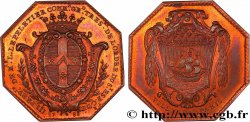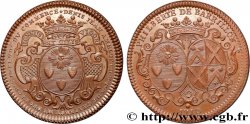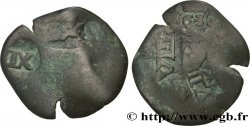E-auction 34-12576 - fjt_213224 - PARIS - ILE DE FRANCE Claude Le Peletier, prévot des marchands de Paris 1674
Sie müssen angeschlossen sein und von cgb.fr genehmigt werden, um in einer E-Auktion teilzunehmen.Melden Sie sich an, um zu wetten..Die Kontobestätigungen sind innerhalb von 48 Stunden nach Ihrer Anmeldung gemacht.Warten Sie nicht bis die letzten zwei Tage vor dem Abschluss eines Verkaufs, um Ihre Registrierung abzuschließen. Klickend "BIETEN" verpflichten Sie sich vertraglich, diesen Artikel zu kaufen und Sie nehmen ohne Reserve die allgemeinen Verkaufsbedingungen für den e-auctions zu cgb.fr an.
Der Verkauf wird an der Zeit auf der Übersichtsseite angezeigt geschlossen werden. Angebote, die nach der Schließung Zeit empfangen sind, werden nicht gültig.
Bitte beachten Sie, dass die Fristen für die Einreichung Ihres Angebots auf unsere Server können variieren und es kann zur Ablehnung Ihres Angebots entstehen, wenn es in den letzten Sekunden des Verkaufs gesendet wird. Die Angebote sollen mit ganzer Zahl ausgeführt sein, Sie können Kommas oder des Punktes in Ihrem Angebot nicht erfassen. Bei Fragen klicken Sie hier, um einen Blick auf die FAQ E-Auktionen.
KEINE ANSCHAFFUNGSKOSTEN FÜR DIE KÄUFER.
KEINE ANSCHAFFUNGSKOSTEN FÜR DIE KÄUFER.
| Schätzung : | 18 € |
| Preis : | 5 € |
| Höchstgebot : | 5 € |
| Verkaufsende : | 09 Dezember 2013 18:35:00 |
| Bieter : | 3 Bieter |
Type : Claude Le Peletier, prévot des marchands de Paris
Datum: 1674
Metall : Messing
Durchmesser : 26,5 mm
Stempelstellung : 6 h.
Rand lisse
Seltenheitsgrad : R1
N° im Nachschlagewerk :
Vorderseite
Titulatur der Vorderseite DE. LA. 3E. PREV. DE. MRE. CLAUDE. LE. PELETIER.
Beschreibung Vorderseite Écu aux armes de Paris.
Rückseite
Titulatur der Rückseite PERRVPIT. HERCVLEVS. LABOR ; À L'EXERGUE : TRAIECT. CAPT. 1674.
Beschreibung Rückseite Un monstre à trois têtes s'échappant par une brèche des murailles de la ville de Maestricht.
Übersetzung der Rückseite C'est par un travail d'Hercule qu'il a forcé le passage ; à l'exergue : LA PRISE DE L'ÜTRECHT.
Kommentare
Au cours de la guerre de Hollande, Louis XIV prend la ville de Maestricht, qui capitule le 30 juin 1673. Représentation prémonitoire.
Claude Le Peletier, seigneur d’Ablon, de Montmélian, de Morfontaine...., né en juin 1631, d’abord conseiller au Châtelet, il passa, le 29 janvier 1652, au Parlement, où il devint, en 1662, président de la cinquième chambre des enquêtes. Après la mort de Gaston, duc d’Orléans (2 février 1660), il fut tuteur des filles de ce prince. En 1667, il fut choisi pour doyen d’honneur de la Faculté de droit. Nommé conseiller d’État en 1673, il fut appelé, en 1683, après la mort de Colbert, au poste de contrôleur général des finances, qu’il occupa jusqu’en septembre 1689, et il fut, en outre, créé ministre d’État. En 1686, il acheta une charge de président à mortier, qu’il céda, trois ans après, à son fils Louis. Enfin, il fut chargé de la surintendance des postes en 1671, en remplacement du marquis de Louvois. Désirant le repos, il se démit de ses emplois en 1697, et il mourut, dans la retraite, le 10 août 1711, à quatre-vingt ans.
During the Dutch War, Louis XIV captured the city of Maastricht, which capitulated on June 30, 1673. A premonitory representation. Claude Le Peletier, Lord of Ablon, Montmélian, Morfontaine...., born in June 1631, first a councilor at the Châtelet, he moved to Parliament on January 29, 1652, where he became, in 1662, president of the fifth chamber of inquiries. After the death of Gaston, Duke of Orléans (February 2, 1660), he was tutor to the daughters of this prince. In 1667, he was chosen as honorary dean of the Faculty of Law. Appointed State Councilor in 1673, he was called, in 1683, after the death of Colbert, to the post of Comptroller General of Finances, which he held until September 1689, and he was, in addition, created Minister of State. In 1686, he bought a position of president of mortar, which he ceded, three years later, to his son Louis. Finally, he was charged with the superintendence of the posts in 1671, replacing the Marquis de Louvois. Desiring rest, he resigned from his jobs in 1697, and he died, in retirement, on August 10, 1711, at the age of eighty.
Claude Le Peletier, seigneur d’Ablon, de Montmélian, de Morfontaine...., né en juin 1631, d’abord conseiller au Châtelet, il passa, le 29 janvier 1652, au Parlement, où il devint, en 1662, président de la cinquième chambre des enquêtes. Après la mort de Gaston, duc d’Orléans (2 février 1660), il fut tuteur des filles de ce prince. En 1667, il fut choisi pour doyen d’honneur de la Faculté de droit. Nommé conseiller d’État en 1673, il fut appelé, en 1683, après la mort de Colbert, au poste de contrôleur général des finances, qu’il occupa jusqu’en septembre 1689, et il fut, en outre, créé ministre d’État. En 1686, il acheta une charge de président à mortier, qu’il céda, trois ans après, à son fils Louis. Enfin, il fut chargé de la surintendance des postes en 1671, en remplacement du marquis de Louvois. Désirant le repos, il se démit de ses emplois en 1697, et il mourut, dans la retraite, le 10 août 1711, à quatre-vingt ans.
During the Dutch War, Louis XIV captured the city of Maastricht, which capitulated on June 30, 1673. A premonitory representation. Claude Le Peletier, Lord of Ablon, Montmélian, Morfontaine...., born in June 1631, first a councilor at the Châtelet, he moved to Parliament on January 29, 1652, where he became, in 1662, president of the fifth chamber of inquiries. After the death of Gaston, Duke of Orléans (February 2, 1660), he was tutor to the daughters of this prince. In 1667, he was chosen as honorary dean of the Faculty of Law. Appointed State Councilor in 1673, he was called, in 1683, after the death of Colbert, to the post of Comptroller General of Finances, which he held until September 1689, and he was, in addition, created Minister of State. In 1686, he bought a position of president of mortar, which he ceded, three years later, to his son Louis. Finally, he was charged with the superintendence of the posts in 1671, replacing the Marquis de Louvois. Desiring rest, he resigned from his jobs in 1697, and he died, in retirement, on August 10, 1711, at the age of eighty.








 Berichten über einen Fehler
Berichten über einen Fehler Die Seite drucken
Die Seite drucken Teilen meiner Auswahl
Teilen meiner Auswahl Stellen Sie eine Frage
Stellen Sie eine Frage Einlieferung/Verkauf
Einlieferung/Verkauf
 Details
Details















